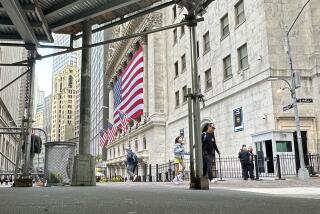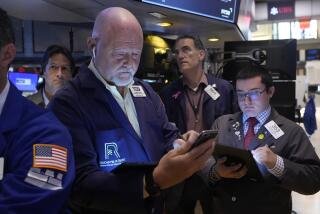IBM Move Sparks Rally; Dow Up 14.08
Market Overview
Highlights of Tuesday’s market activity, compiled from Times staff and wire reports:
* Stocks advanced in volatile trading that included a late rally touched off by an announcement that IBM is restructuring. The Dow Jones industrial average rose 14.08 points to 2,916.14.
* Bond yields fell after a report showing that consumer confidence plunged in November, but the rally was tempered by anxiety over how Washington might stimulate the faltering economy.
* The dollar rocketed on reports that a key German official favors a stronger U.S. currency.
Stocks
IBM’s announcement that it will eliminate 20,000 more jobs and take a $3-billion fourth-quarter charge sent its stock surging and thus lifted the Dow index.
IBM jumped 2 3/4 to 97 7/8, and its rise was responsible for 5.5 points of the Dow’s gain. The index had been down much of the day.
The IBM-inspired rally helped advancing issues outnumber declining ones by 10 to 9 on the New York Stock Exchange.
Trading was heavy during what many expected would be a light holiday week. Big Board volume came to 213.81 million shares, up from 175.87 million Monday.
Tuesday’s session was particularly volatile. Prices opened higher before computer-triggered program selling sent them into a tailspin. Much of the decline was laid to news that the Conference Board’s index of consumer confidence fell in November to a level last seen in 1982.
After being down 30 points, the Dow went back on the plus side on the IBM news.
Still, many analysts fear that the selling mood created by the Dow’s surprise 120-point plunge Nov. 15 is unlikely to lift before the end of the year.
Among the market highlights:
* Many stocks that are sensitive to interest-rate moves fared well, on the assumption that the latest consumer confidence figures all but guarantee another Federal Reserve cut in rates.
Utility stocks, for example, surged. The Dow utility index jumped 3.25 points to 216.57, a 1.5% gain. Among utilities, Houston Industries rose 1 to 40 1/4, SCEcorp gained 1/2 to 45 3/8, and Pacific Gas & Electric added 3/4 to 30 7/8.
Among mortgage and consumer-finance firms, Beneficial jumped 1 3/4 to 58, Federal Home Loan Mortgage rose 1 1/4 to 98 1/4, and Federal National Mortgage gained 1 3/4 to 58.
* Interest-rate hopes couldn’t help big California bank stocks, though. BankAmerica dropped 1 1/2 to 32 and Wells Fargo 3/4 to 56 3/4.
* Drug stocks continued to be under pressure on worries about limits on drug price increases. Bristol-Myers Squibb was the most active Big Board issue, losing 2 1/8 to 75 3/4. Among others, Merck fell 2 to 143 1/4, Syntex lost 3/4 to 38 3/4, and Upjohn slid 7/8 to 40 1/4.
HMO stocks also weakened. FHP International fell 1 3/4 to 11, and PacifiCare dropped 1 7/8 to 23 1/8.
* Some industrial issues rebounded from recent drubbings. Monsanto jumped 1 7/8 to 61 3/4, Illinois Tool Works soared 2 3/8 to 63 3/4, Cummins Engine added 1 1/8 to 46 3/8, and GM was up 1 to 31 3/8.
* Food stocks were a bright spot. Coca-Cola rose 2 to 70 1/2, Kellogg gained 1 1/2 to 105 7/8, General Mills added 1 to 66, and thinly traded Anaheim-based Bridgford Foods jumped 3 to 29.
Overseas, London stocks gained, with the Financial Times 100 index up 15.3 points to 2,471.5. In Frankfurt, the DAX index rose 13.71 points to 1,602.87.
In Tokyo, the Nikkei average came back from nine days of losses, rising 243.40 points to 23,112.09.
Credit
Treasury bond yields tumbled on the dismal consumer confidence report, then inched upward in late trading. Still, for the day the yield on the Treasury’s 30-year bond closed at 7.94%, down from 7.98% Monday.
The weak economy suggests that the Federal Reserve will have to cut interest rates again soon, analysts say.
But John Hickey, senior vice president at Kansallis Banking Group in New York, said bond yields moderated Tuesday when traders began speculating that the government also will take economy-stimulating steps--such as a tax cut--that might escalate inflation in the long run.
The federal funds rate, the rate on overnight loans between banks, fell to 4 5/8% from 4 15-16%.
Currency
The dollar took a wild ride, first tumbling on the gloomy consumer confidence report, then surging on word that Germany’s economics minister said its value was too low.
The minister, Juergen Moellemann, reportedly said he believed that the dollar’s exchange rate should be between 1.65 and 1.75 German marks, instead of the 1.58 level at which it has been trading.
Moellemann’s office later issued a statement maintaining that the minister had simply said German exporters favor the 1.60-to-1.70-mark range.
A Moellemann call for a stronger dollar would seem to go against the grain of German economic thinking. A stronger dollar would tend to stimulate inflation in Germany by raising the cost of imported goods. Inflation is that nation’s great fear.
In New York, the dollar surged to 1.611 marks from Monday’s 1.588. Against the Japanese yen, it closed at 130.15, up sharply from 127.90.
Commodities
Wheat futures prices fell sharply on the Chicago Board of Trade as Soviet food-aid delays and a stronger dollar prompted profit taking after several days of strong gains.
Wheat for delivery in December fell 8 cents to $3.64 1/4 a bushel. The slide erased more than a third of the 22-cent gain posted over the six previous sessions.
Wheat was pressured in part by lack of an Agriculture Department announcement on how the latest round of Soviet food aid will be allocated. The department said it had received a Soviet request for a commodity mix to be purchased with $500 million in U.S. aid, but authorities gave no details.
Grain markets weakened further late in the session after the dollar surged. A strong dollar makes U.S. goods more expensive overseas.
Oil futures slid on the New York Merc Exchange as OPEC ministers meeting in Vienna signaled their willingness to extend a “free-for-all” policy of pumping crude at near capacity to meet cold-weather demand. Light, sweet crude for January delivery fell 40 cents to $21.02 a barrel.
Gold futures weakened on New York’s Comex as traders squared their positions before delivery of the December contract begins Friday. Gold for December fell $2 to $366.30 a troy ounce. December silver was unchanged at $4.075.
Market Roundup, D8
More to Read
Inside the business of entertainment
The Wide Shot brings you news, analysis and insights on everything from streaming wars to production — and what it all means for the future.
You may occasionally receive promotional content from the Los Angeles Times.










